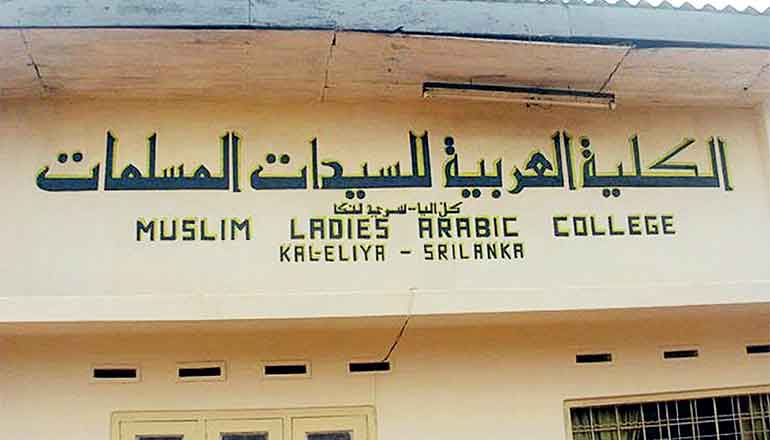Sunday Feb 22, 2026
Sunday Feb 22, 2026
Tuesday, 24 June 2025 00:41 - - {{hitsCtrl.values.hits}}

 The petitioners’ counsel, a prominent attorney-at-law, strongly argued that since the Kal-Eliya Muslim Ladies’ Arabic College had already been incorporated under Act No. 46 of 1991 by Parliament, it could not be governed or registered under another statute. Therefore, they claimed the Wakf Board had no authority to register or administer the College under the Wakf Act, No. 51 of 1956.
The petitioners’ counsel, a prominent attorney-at-law, strongly argued that since the Kal-Eliya Muslim Ladies’ Arabic College had already been incorporated under Act No. 46 of 1991 by Parliament, it could not be governed or registered under another statute. Therefore, they claimed the Wakf Board had no authority to register or administer the College under the Wakf Act, No. 51 of 1956.
Ironically, the very petitioners who now assert that the College is governed solely by this Act have continuously disregarded its core provisions—meant to uphold transparency and accountability in the administration of a public charitable trust. In the 35 years since incorporation, no such society has been formed, no annual general meetings have been held, and no Board elections have taken place. Instead, control of the College has remained within the family of a single founder, in direct violation of both the letter and spirit of the ActBackground of the Incorporation ActIn the 1980s, a legal action was instituted in the Gampaha Court (Case No. 24417/M) against members of the then Board of Management for alleged misappropriation of College funds. As a way of prevention of repetition of such mismanagement and of ensuring the good governance, the management, together with prominent Muslim leaders and intellectuals, pursued the registration of the College through incorporation by an Act of Parliament, with the aim of ensuring transparency, accountability, and sound governance. This led to the enactment of The Board of Management of the Muslim Ladies Arabic College Managing Society, Kal-Eliya (Incorporation) Act, No. 46 of 1991.Under this Act, a society comprising of Muslim men over the age of 21 was to be constituted, with financial reports to be approved at an annual general meeting, and the office bearers of the Board of Management elected every three years, in accordance with paragraphs 4 and 9 of the Rules, read with Section 4 of the Act.Ironically, the very petitioners who now assert that the College is governed solely by this Act have continuously disregarded its core provisions—meant to uphold transparency and accountability in the administration of a public charitable trust. In the 35 years since incorporation, no such society has been formed, no annual general meetings have been held, and no Board elections have taken place. Instead, control of the College has remained within the family of a single founder, in direct violation of both the letter and spirit of the Act.If the Act had been followed properly, today’s disputes and the need to approach courts or the Wakf Board would not have arisen.Coexistence of the Incorporation Act and Wakf LawsThe goals of the Incorporation Act of the College and the Wakf registration are not contradictory. Both aim to ensure that the institution fulfils its charitable objectives transparently and accountably. Due to the mismanagement and deviation from this purpose, actions were taken under both the District Court, based on the Incorporation Act and the Wakf Act, based on purpose and founding objectives of the College.Protecting Muslim charitable institutions is a social dutyThough many Muslim charitable institutions in Sri Lanka were founded by individuals, their development has been the result of broad community’s financial, material and intellectual supports. Hence, these institutions are public properties established for the benefit of the public and cannot be considered private property. It is deeply concerning that some are now misused by the administrators including by the very heirs of founders.Despite its flaws, the Wakf Act, No. 51 of 1956 remains the best mechanism to protect Muslim charitable properties. Failing to fulfil one’s responsibilities in this regard not only incurs community condemnation but also divine accountability.(The writer is a retired Deputy Commissioner General, Inland Revenue Department. He can be reached at [email protected].)Recent columns
COMMENTS